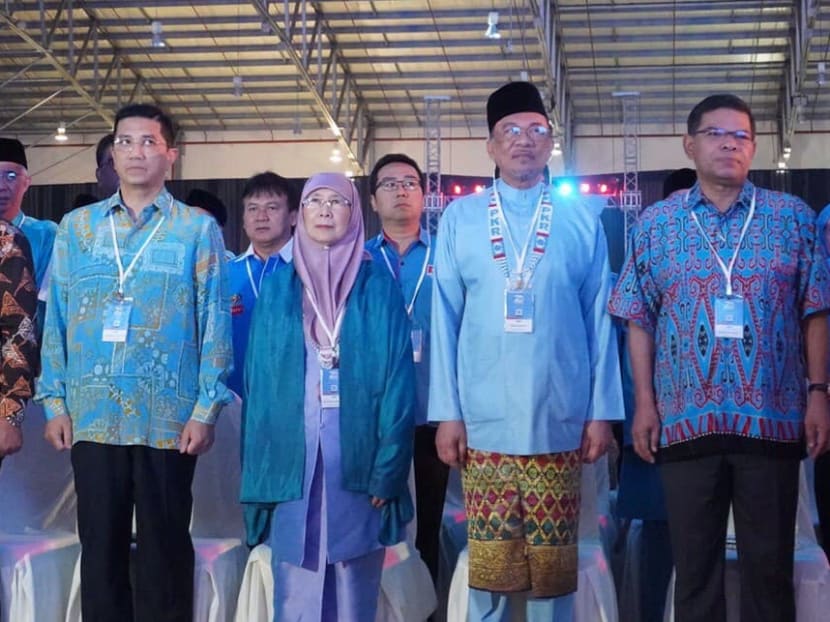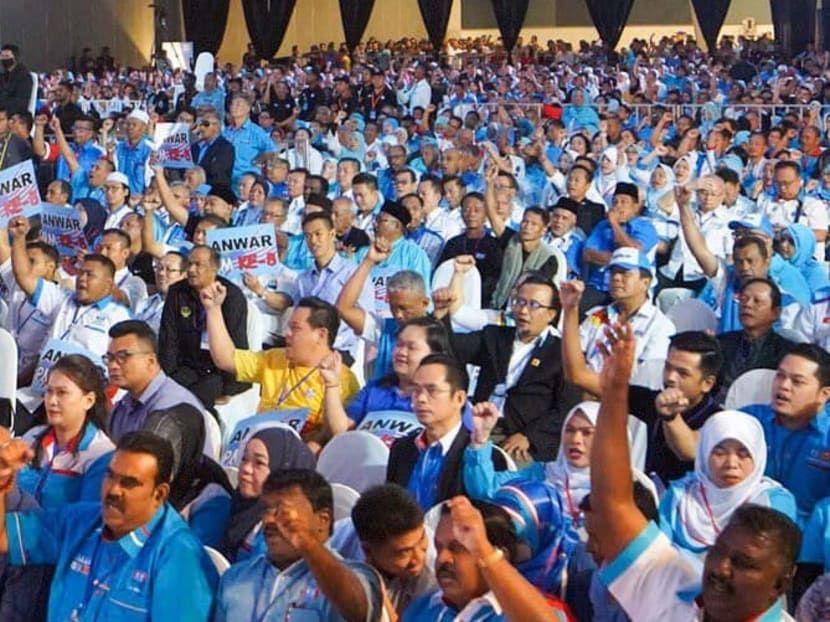Here’s what the drama at Malaysian political congresses means for the key players
Last week, Malaysia’s political parties Parti Keadilan Rakyat (PKR), United Malays National Organisation (Umno) and Amanah separately held their annual congresses.

PKR president Anwar Ibrahim (second from right) and his deputy Azmin Ali (second from left) at the party congress.
Last week, Malaysia’s political parties Parti Keadilan Rakyat (PKR), United Malays National Organisation (Umno) and Amanah separately held their annual congresses.
Dominating the headlines were the scuffles and barbs that flew between rival camps aligned to party president Anwar Ibrahim and deputy president Azmin Ali at PKR’s gathering. Some observers argued that this was in contrast to the smooth sailing meeting over at Umno. The truth is that both parties are equally fragmented, with members of each party suspicious of one another.
Out of the three congresses, Amanah’s was the least eventful.
PKR, formed two decades ago at the height of the reformasi movement after the sacking of then deputy prime minister Anwar, is now the biggest party in the ruling Pakatan Harapan (PH) coalition.
On the other hand, Umno is the biggest party in the opposition. After its shocking election defeat last year, it has undergone a mini revival after securing four out of five by-election victories this year — in Pahang, Negeri Sembilan, Selangor and Johor.
As expected, the Democratic Action Party (DAP) was the main target of Umno leaders at its congress. For instance, Umno president Ahmad Zahid Hamidi ridiculed DAP for its silence over the move to bring the ashes of the late Malayan Communist Party leader Chin Peng back to Malaysia.
Zahid’s message: The country is under attack by liberals, anti-Malay and anti-Islam sentiments as well as communist sympathisers. PH is to be blamed for this by giving in to the DAP for far too long.
This was clearly aimed at the Malay ground, especially families which had suffered losses during the communist insurgency from the 1940s to the 1960s.
Yet, the Umno congress offered nothing substantive in terms of policy suggestions.
Instead, there were warnings by its leaders against potential defections to PH. The president assured delegates that he has spoken to current Umno MPs and did not question their loyalty to the party.
Interestingly, the feudal concept of loyalty to the leader has been a recurrent theme of the past Umno annual congresses, including those when Najib Razak was still prime minister.
Disagreements within the party’s top ranks, which led to the ouster of former deputy prime minister Muhyiddin Yassin, had contributed to Umno’s 2018 electoral defeat.
Mr Muhyiddin later teamed up with Dr Mahathir to form Bersatu and helped win the election for PH. Since the last election, Umno has lost former minister Mustapa Mohammad to Bersatu, and a few other leaders have also left the party.
Recently, 22 Umno MPs held a secret meeting over dinner at Mr Azmin’s house, although it remains unclear what was discussed.
Former Umno vice president Hishammuddin Hussein attended the closed-door meeting, fuelling talk that he is engineering the defection of a group of Umno MPs. He has denied that such a plot exists, but one delegate urged Umno leaders to be careful of “termites” that could weaken the foundations of the party.
Buoyed by back-to-back by-election victories for the opposition, the Umno assembly still demonstrated a greater show of unity compared to the PKR congress.
But this show of solidarity may be tested again soon should fresh allegations of its leaders’ wrongdoings surface or if Najib and Zahid are found guilty of their current charges of corruption, among others. Also, some Umno delegates are pushing for the existing collaboration with Parti Islam Se-Malaysia (PAS) to be upgraded to an official alliance.
How Umno’s non-Malay partners Malaysian Chinese Association and Malaysian Indian Congress receive this remains unclear, given PAS’ conservative brand of Islam.
The silence of some Umno leaders who have championed multiracialism and secularism, such as Khairy Jamaluddin, on the PAS alliance also signals that there may be segments in the party that are not comfortable with the move.

Anwar supporters at the PKR congress in Melaka. Photo: Anwar Ibrahim/Facebook
The PKR congress, on the other hand, was marred by sharp, open divisions. What was earlier thought to be a reconciliation between Mr Anwar and Mr Azmin turned out to be short-lived.
Before the congress, tensions arose between the two top leaders, and Mr Azmin skipped many of the party’s meetings. There were also rumours that Mr Azmin planned to organise a parallel congress in Kuala Lumpur separate from the official one in Melaka, though he denied such a plan ever existed.
Skirmishes broke out during the youth wing meeting when leaders close to Mr Azmin were denied entry into the gathering, and a few punches were exchanged. Then, about 100 PKR leaders staged a walkout during the assembly after delegates close to Mr Anwar’s camp made fiery speeches directed at Mr Azmin.
The outcome of the PKR congress has heightened doubts on whether Mr Anwar can lead the country since he cannot even unite his party.
The ruling PH coalition is weak at this moment. With back to back by-election defeats, and public unhappiness resulting from unfulfilled promises, Prime Minister Mahathir Mohamad’s reform agenda may have stalled. Yet, not all is well in Umno either.
Judging from how the congresses went, Malaysian politics and the loyalties of political players remain in flux.
By the look of it, Mr Azmin would appear to have emerged from the whole episode in a slightly better light than the others.
He appeared to want to share the details of the government’s Malaysia Shared Prosperity Vision 2030 at the congress, which was initiated in part to uplift the lives of the poor. So, not only was he seen as being victimised by the party he helped build, he could be perceived as being more interested in governing and less in politicking.
The Anwar camp, on the other hand, was mainly interested in making their leader Malaysia’s eighth prime minister, holding placards indicating “Anwar the 8th PM”.
Another benefactor is arguably Dr Mahathir, who was not involved in any of the weekend drama. The divisions and current political flux would only justify why he should stay on until the end of his term as prime minister.
PAS, some Umno and PKR members (especially Mr Azmin) have already supported this, ditching the so-called agreement that he will hand over to Mr Anwar before the next polls.
The episode is a test for Mr Anwar’s political leadership, and as he himself admitted, he must persuade disgruntled PKR members to come back into the fold. But this is only the first step.
He has to revive PH’s winning formula and win the hearts and minds of Malaysians at the grassroots level. He has less than three and half years to regain Malaysians’ confidence. His only consolation is that the rival Umno too is still undergoing its own soul-searching.
ABOUT THE AUTHOR:
Norshahril Saat is Fellow at Iseas-Yusof Ishak Institute. He is the author of The State, Ulama and Islam in Malaysia and Indonesia.






